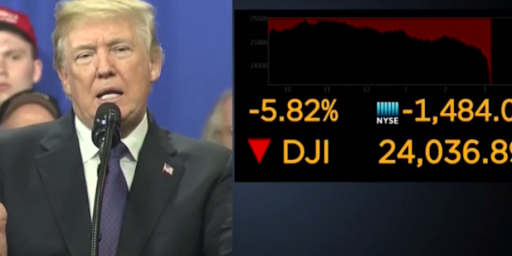By the Pricking of My Thumbs
This morning OPEC has announced a plan to cut oil production by 1.5 million barrels a day:
VIENNA — The OPEC cartel said Friday that it would reduce its oil production by at least 1.5 million barrels a day to stem what it called “a dramatic collapse” in oil prices as the world economy slows down and oil demand shrinks.
The reduction, which is the deepest since 2003, was announced at an emergency meeting here and will come into effect on Nov. 1, according to Ali al-Naimi, Saudi Arabia’s oil minister.
But OPEC’s announcement, which exceeded what many experts had expected, failed to slow the downward spiral in prices. After the meeting, oil futures in electronic trading in New York fell as much as 7 percent to $63 a barrel, their lowest since May 2007. Oil prices have been more than halved since peaking at $147 a barrel in July.
The decline came as stock markets around the world suffered another dark day following bleak corporate earnings. The FTSE 100 in London slipped by more than 7 percent. In New York, futures also pointed down.
There’s something seductive about a sudden rise in income. Despite any determination to keep living the same way you did before the windfall inevitably you begin living in a way befitting your new income. What was once a luxury has now become a necessity.
That’s the fix that oil-exporting countries, including Russia, Iran, Venezuela, and Saudi Arabia, find themselves in. They’ve become very accustomed to all of those lovely petrodollars and they don’t want to let go of them. So even as consumption sags under the weight of economic downturn, they’re attempting to raise the price by reducing the supply. That this requires members to forego current income in favor of hoped-for increases and, if successful, will further slow their customers’ economies does not seem to be of overwhelming concern to them.
OPEC is engaged in a perilous game. Falling commodity prices have been one of the only positive signs in a profoundly depressed economic landscape. Even China, long the main engine of oil demand growth, is showing signs that its economy has hit a speed bump.
“They are walking a very, very fine line,” said Jan Stuart, an energy economist at UBS in New York.
The last time oil prices fell below $50 a barrel was at the end of 2006, prompting the Saudis and other producers to engineer two deep cuts, totaling 1.7 million barrels a day. The strategy worked, and helped set the stage for last summer’s price run.
When is a 300-point plunge a relief?
Wall Street was pondering that question on Friday as stocks in the United States picked up a sharp sell-off that began in Asia and Europe. But before theopening bell, things appeared much worse.
Stock futures, essentially what investors are betting will happen after the bell, fell so sharply that their trading had to be halted on Friday morning. The size of the declines had reached a set limit, with futures on the Dow Jones industrial average down by 550 points.
Concerns about oil prices aren’t the only things spurring this downward move. Even more important are dismal corporate earnings reports, these pushed down by flagging consumer spending. The slowdown is global, suggesting that the downturn might be a lengthy one.
Something wicked this way comes.






Indeed.
How now, you secret, black, and midnight hags!
What is’t you do?
Dave;
While I don’t argue with the idea that increased income is attractive to the countries you mention, there’s a dynamic you don’t mention; Iran.
Iran’s cost of recovery is around $85/bbl, mostly becuase their infrastructure sucks… their investments in equipment for it have been far too low) so prices below this cost them the most. They were the ones who called this meeting, and who were most loud in pushing for the cut. The other countries you mention, who have lower costs of recovery, not so much.
As a side note, this action demonstrates the utter futility of the “dill here, drill now” refrain. No matter how much oil we can put on to the market, OPEC, with a snap of their fingers and twirl of the tap can negate any action we take on the production side.
It does however prove that by aggressively conserving we can flex the demand side of the equation to rattle OPEC enough to stay docile (and put less dollars into their hands). We won’t because the amount of cognitive ability it takes to grasp that simple fact is lost on anyone for whom “dill here, drill now” seems like a reasonable policy.
It also means that when we do drill our last domestic finds (and we will) we will be much further along in actually providing a solution to the problem then we are now.
But, so can we, negate a lot of THEIR action, if we have drills going.
The reason they have so much control is they’re the only ones with rigs going.
Do you really consider, Rick, taht they’d be playing this game, if there were oil on the market they couldn’t control directy?
I don’t.
Fortunately, our largest source of oil imports isn’t an OPEC member.
What are you saying here Bits? That only OPEC nations produce oil? “The only ones with rigs going”?
How are “drills” going to negate anything? Producing wells yes, drills? All they represent is potential…
And potential is what futures prices are set by.
Consider the recent steep drop in the price. What started that little sleigh ride? Not Americans actually drilling for oil, but Americans TALKING about drilling for oil, fairly seriously.
Still waiting to hear what you mean here.
You are over-simplifying. There was a speculation bubble that popped and an economic meltdown you may have heard about.
We will probably end up doing a lot more drilling. But in the long run, it is giving aspirin to someone with cancer. If we don’t get beyond fossil fuels, our civilization will eventually suffer a near or total collapse.
But what was speculation running so high until then? Mostly beacuse the Americans had kept their own oil off the table.
Well, yeah, sometime 100 years or so from now, assuming no new discoveries and no new recovery technology.
Somehow, I don’t share your urgency.
Glad you are so confident. Did you think, a year ago, that the economy might suffer a near-fatal heart attack in 2008? Yet it happened.
News flash. If interstate trucking stopped rolling, we would have people killing each other for food inside of a month.
Third request for you to address this rather extraordinary claim:
Yeah, I’ll bet that had ’em quaking in their sandals.
You mean you really can’t figure out an illustrative line? Or are you just playing your baiting game again? Forgive me if with your history I don’t take you very seriously anymore.
(Sigh) OK… Since you insist on playing the simpleton, the more sources of oil there are the less weight OPEC has on the world market. Right?
Sure, it happened. ‘Course, now, the reasons it happened are far less physical than the amount of oil on record, isn’t it? We KNOW how much oil we have. Even at the current rate of projected increases in consumption, we have enough to supply our own neads for nearly a century, even assuming we import no more oil, starting tommrow.
We know the likelyhood of imports being halted is quite low, so that’s not going to happen, which of course extends our supply that much further. Add to that new discoveries and new recovery meathds and we get even further down the years.
So, the question; Are you really so bent on getting us off an energy that we have literally over 100 years of known supply of?
WHY?
Or are you saying the Democrats are going to foul that one up, too, as they did the economy itself?
Given their ‘no drill, no coal, no nukes” policies of the last 60 years, granted, they have a hell of a head start on ruining our future…. but you see that as a GOOD thing, doubtless.
Of itself? No. But when the markets reacted? Well, why do you think they called an emergency meeting, hmmm?
no bit you are wrong, we could drill and pump to the very height of our ability to do so and it would not make any difference on the world market.
The Alaskan pipeline could close down tomorrow and it wouldn’t make a wit of difference in oil prices (this already happened actually so it’s not just a wild ass conjecture).
What you know about energy economics Bit you could put in a thimble.
All an increase in the rate of production will do is insure that we short sheet ourselves all that much faster and really become beholden to OPEC. But if that’s your goal Bit, it’s the best way to do it 🙂
Again, yeah, right.
GOP: Oil markets ‘responding’ to our protest
Really? You are willing to bet our economy that the war with Iran you seem to want so badly won’t disrupt the flow of oil?
Bit! Words mean things! “the only ones with rigs going” means we don’t have ANY rigs going. You just said there are NO rigs going in America. Lay off the glue…
Dave: I think you err in including Saudi Arabia among those being hit hard by the price slide. The Saudis claim that they’ll be just fine with a $50/bbl price. That means that they could actually manage at a lower level, say in the $35-$40 range.
The Saudis, while they have come up with some huge projects, have not promised to pay for them with tomorrow’s profits. In fact, their 2008 budget is based on the price of oil in 2006.
A long, steep decline would affect them, but largely in forcing a slow-down in the biggest projects or trimming some of the bells and whistles. There are a lot of desirable-but-not-urgen projects that can be cut before anything serious has to go. That’s not at all the case for Venezuela or Iran, the price hawks.
As price doves, the Saudis have been cautioning OPEC about killing the golden goose by pushing prices too high. They went into this meeting resisting a production cut, but see continued value to go along with OPEC.
The KSA also has the advantage, unlike Iran or Venezuela, of being the low-cost supplier of high-grade crude.
All of which ignores, of course the price differences it caused when it came Online. It also ignores the actions OPEC took every time a new source has threatened to come online… they’ve lowered the per bbl costs to try and make the new source less attractive. Sorry, I’m not buying it. Supply and Demand. Any increase of availability in a commodity, lowers the price.
Ah, yes, the old ‘we only have 2% of the world’s oil” nonsense. That assumes all our oilfields are still off limits, which of course is government sticking it’s nose in. Again, no sale. BY the way, ever heard of Bakken?
Bull. If they were that interested in shutting us off why on earth would they be screaming for more money? Clearly, thegy want in on this gravy train far more than they want Jihad.
Sure, Anjin. Are we’re still supposed to take you seriously when you try sludge like this? Get real, or get lost.
Correct, John. The issue os the cost of recovery. At the current per bbl price, Iran is about $25/bbl below their recovery costs. Hence the meeting last night. The Saudis have far lower recovery costs, as does Kuwait and a half dozen others in the region.
According to this article, The Bakken Formation: How Much Will It Help?, the USGS estimates there are 4.1 billion barrels of recoverable oil in the Bakken. The author disputes this (she thinks only about 500 million barrels are recoverable), but let’s take the USGS number as a given. The US uses about 7.6 barrels of oil products a year. The USGS figure would represent little more than 6 months of oil for us spread over the 20-year recovery period (only 23 days if her 500 million barrel figure is correct).
But do read the article, it’s really interesting and informative.
I am just quoting you bubba, your worlds:
The disconnect with reality is obvious, and its easy to see why you refuse to discuss your own comments.
You also said that an interruption of oil supplies “is not going to happen”.
Of course you have also said that Palin was going to crush the Democrats and the military is not part of the government, so it is pretty clear that you are not good for much beyond comic relief…
Mildly so, but as is so typical, it seriously under-estimates the thing to the point of being counter productive. Of course, that’s not unusual for the ‘drill not’ crowd inhabiting USGS, who, insisted we’d only get 5 years out of Prudhoe bay, and in total we’d only get less than 10% of the crude we’ve gotten so far.
One reports on Bakken I have to hand, here on my desktop (PDF) from EOG Resources out of Houston, reported that a single well it had drilled into an oil-rich layer of shale below Parshall, North Dakota is anticipated to produce 700,000 barrels of oil. That’s one site.
See, here’s the real problem with the USGS report you cite; USGS defines Bakken as unconventional “continuous-type†oil resources. Translation: The hydrocarbons within the Bakken havn’t accumulated into discrete reservoirs of limited areal extent. That means new drilling styles are ignored outright in the USGS estimate, thus drastically lowering it.
When using the more recently developed horizontal drilling, and other styles as well that the USGS doesn’t use in their recoverability assessments, the total estimates from the private concerns on site range to over 25billion BBL of oil… mostly of 41 degree light crude…. high quality stuff.
EOG reports that their cost of recovery for that one swath I mentioned to be about $5MUSD, which they recovered in less than 6 months, by the way.
On the northern side of the border, Pertobank is reporting similar numbers.. number that far outstrip the USGS estimate.
In light of the history of all of this, you’ll understand why I essentially ignore the ‘it ain’t gonna fly, Orville’ attitude.
“”Even more important are dismal corporate earnings reports.””
“””””””””””””””””””””””””””””””””””””””””””””””
????? It is hard to find stock that is trading below 10 times earnings. It is easy to find 13-20 P/E ratios. This sentence should read more like…
“Even more important is the stupefying fear and distrust of the market in the face of bargain P/E ratios.”